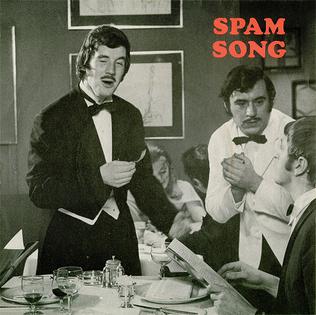
"Spam" is a Monty Python sketch, first televised in 1970 and written by Terry Jones and Michael Palin. In the sketch, two customers are lowered by wires into a greasy spoon café and try to order a breakfast from a menu that includes Spam in almost every dish, much to the consternation of one of the customers. As the waitress recites the Spam-filled menu, a group of Viking patrons drown out all conversations with a song, repeating "Spam, Spam, Spam, Spam… Lovely Spam! Wonderful Spam!".

"The Lumberjack Song" is a comedy song by the comedy troupe Monty Python. The song was written and composed by Terry Jones, Michael Palin, and Fred Tomlinson.
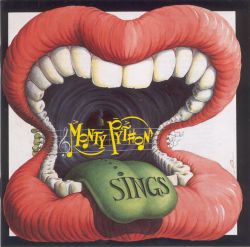
Monty Python Sings is a compilation album of songs by English comedy troupe Monty Python. Released in 1989 to celebrate their 20th anniversary, it contains popular songs from their previous albums and films. The album was dedicated to the memory of founding member Graham Chapman, who died two months before its release.
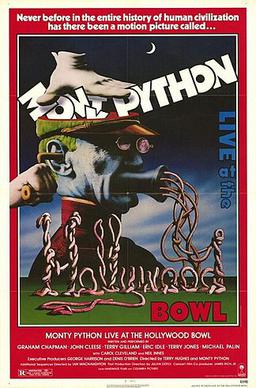
Monty Python Live at the Hollywood Bowl is a 1982 concert comedy film directed by Terry Hughes and starring the Monty Python comedy troupe as they perform many of their sketches at the Hollywood Bowl. The film also features Carol Cleveland in numerous supporting roles and Neil Innes performing songs. Also present for the shows and participating as an 'extra' was Python superfan Kim "Howard" Johnson.
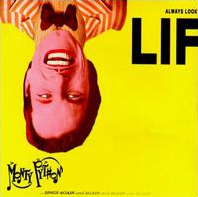
"Always Look on the Bright Side of Life" is a comedy song written by Monty Python member Eric Idle that was first featured in the Python film Life of Brian and has gone on to become a common singalong at public events such as football matches as well as funerals.

The Final Rip Off is a compilation double album by Monty Python, released in 1987. It was the team's first release on Virgin Records, after the label acquired the rights to their back catalogue previously released on Charisma. The set contains material from those six albums, but not from the Life of Brian or The Meaning of Life soundtracks, which were released on other labels. Michael Palin added some new linking material while all the songs were remixed by producer Andre Jacquemin including one, "Henry Kissinger", which featured a previously unreleased section. Contrastingly, the selections from Another Monty Python Record and Live at Drury Lane were mixed from stereo into mono. The cover art, with its graphic image of spilling guts, was illustrated by Les Edwards.

The Monty Python Instant Record Collection is the title of two compilation albums by the Monty Python troupe. The first was released in the UK and Canada in 1977 and drew from the group's first three studio albums, first live album, and first soundtrack album on the Charisma label, while the second was released in the US in 1981 and comprised tracks from their four albums released on the Arista label. Billed as "the pick of the best of some recently repeated Python hits again, Vol. II", the record sleeve was designed by Terry Gilliam. The UK/Canadian version originally featured packaging that folded out into a cardboard box resembling a large stack of record albums. An inner sleeve featured a spoof "Where Are They Now?" update on the members of the Python team.

The Ultimate Monty Python Rip Off is a compilation album released by Monty Python in 1994 on the occasion of their 25th anniversary. The album contains no previously unreleased material and was released as a sampler for the simultaneous release of The Instant Monty Python CD Collection box set.

Monty Python's Previous Record is the third album by Monty Python. Released in 1972, it marked the group's first collaborations with regular sound engineer Andre Jacquemin as well as musician Neil Innes, who had previously appeared with future members of the Python team on Do Not Adjust Your Set. The album contains many sketches from the third series of Flying Circus, one from the second as well as an abridged version of "The Tale of Happy Valley" from the second German show. The album was released midway through the broadcast of Series 3, whose sketches featured on the album were all from its first half, with the exception of "Dennis Moore" which aired a month later and therefore made its debut here. The oldest sketch on the album, Eric Idle's "Radio Quiz Game", dates back to I'm Sorry, I'll Read That Again, where it was performed by Graeme Garden – Idle having subsequently performed the sketch himself on two editions of Do Not Adjust Your Set. The rest of the material was specially written for the album.
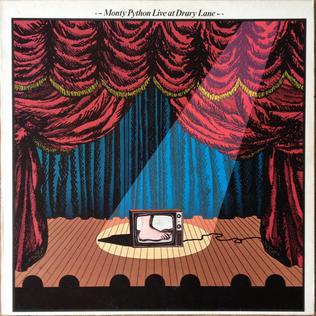
Monty Python Live at Drury Lane is a live album released by Monty Python in 1974. It was recorded on the final night of their four-week run at the Drury Lane Theatre in London earlier that year and edited onto disc with new studio linking material by Eric Idle and Michael Palin. The majority of the sketches are from Flying Circus and vary slightly from their television counterparts, although "Cocktail Bar" was written for the third series but not used. The team also revived sketches from At Last The 1948 Show, including "Secret Service", "Wrestling" and "Four Yorkshiremen" - the latter on its way to being adopted as a Python standard. Neil Innes provided the musical interludes, while Eric Idle's then wife Lyn Ashley replaced regular Python actress Carol Cleveland in supporting roles.

Monty Python Live at City Center is a US-only live album by Monty Python, recorded at the New York City Center in April 1976 and rush released by Arista Records the following month. In order to get the album out in the shops quickly, the recordings were made early on in the run, where some of the performances were affected by faulty microphones. The team were joined onstage by regular actress Carol Cleveland and musician Neil Innes, who also performed in some sketches.
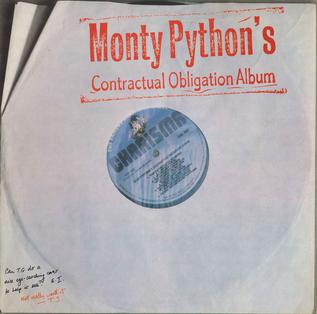
Monty Python's Contractual Obligation Album is the final studio album by Monty Python, released in 1980. As the title suggests, the album was put together to complete a contract with Charisma Records. Besides newly written songs and sketches, the sessions saw re-recordings of material that dated back to the 1960s pre-Python shows I'm Sorry, I'll Read That Again, The Frost Report, At Last The 1948 Show and How To Irritate People. One track, "Bells", dates from the sessions for Monty Python's Previous Record, while further material was adapted from Eric Idle's post-Python series Rutland Weekend Television. The group also reworked material written but discarded from early drafts of Life Of Brian, as well as the initial scripts for what would eventually become The Meaning Of Life.

The Instant Monty Python CD Collection is a box set released in 1994 of six CDs containing eight albums by the Monty Python troupe. It does not include the first Monty Python record, Monty Python's Flying Circus, whose rights are still owned by the BBC.

"Eric the Half-a-Bee" is a song by the British comedy troupe Monty Python that was composed by Eric Idle with lyrics co-written with John Cleese. It first appeared as the A-side of the group's second 7" single, released in a mono mix on 17 November 1972, with a stereo mix appearing three weeks later on the group's third LP Monty Python's Previous Record. On this album, the song followed the routine called "Fish Licence" in which Mr Eric Praline, played by Cleese, tried to obtain a pet licence for an halibut and numerous other pets all named Eric, much to the chagrin of the licence office worker. One such pet is half a bee. The song relates the tale of the half-a-bee, having been "bisected accidentally" by his owner one summer's afternoon.

Python Night was an evening of Monty Python-related programmes broadcast on BBC2 on 9 October 1999, to celebrate the 30th anniversary of the first broadcast of Monty Python's Flying Circus. It featured newly written sketches, three documentaries and a screening of Monty Python's Life of Brian.

Eric Idle Sings Monty Python is a live recording by original Monty Python member Eric Idle performed at the J. Paul Getty Center in Los Angeles in 1999. The concert runs for under an hour and is packed with songs, poems, and arcana from the then-thirty years of Monty Python, with amusing Idle banter between songs. Idle is accompanied by some background singers, and the audience.

Monty Python Live (Mostly) (also billed as Monty Python Live (Mostly): One Down, Five to Go) was a variety show by the Monty Python comedy group at The O2 in London in July 2014. Planned as a single performance for 1 July, it was expanded to 10 shows due to the high demand for tickets. It was their first live performance together in 16 years, the second without member Graham Chapman (who died in 1989) and the last with Terry Jones (who died in 2020).

The Fairly Incomplete & Rather Badly Illustrated Monty Python Song Book is a compendium of songs by Monty Python, released in 1994 on the occasion of their 25th anniversary. The book contains the lyrics and musical scores for songs from the group's Flying Circus TV series, albums and films. Also included are "The Ferret Song" and "Rhubarb Tart Song", which originate from I'm Sorry, I'll Read That Again before appearing on At Last The 1948 Show. The musical scores were edited by regular Python collaborator, John Du Prez.
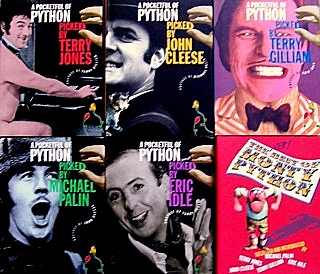
A Pocketful of Python is a series of five books by the Monty Python team, in which each of the surviving members selects their favourite material from the group’s TV series, films, records and books. The first two volumes, by Terry Jones and John Cleese, were released in 1999 as part of the team’s 30th anniversary celebrations. Two further volumes, by Terry Gilliam and Michael Palin, followed in 2000 while the final volume, by Eric Idle, was eventually released in 2002. Each team member’s volume includes a preface written by one of the other Pythons. In 2006 all five volumes were released as a single paperback edition, entitled The Very Best of Monty Python.
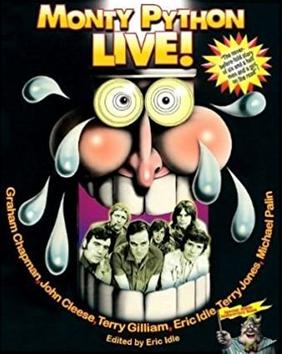
Monty Python Live! is a book detailing the various live performances of the Monty Python team between 1971 and 1980.




















